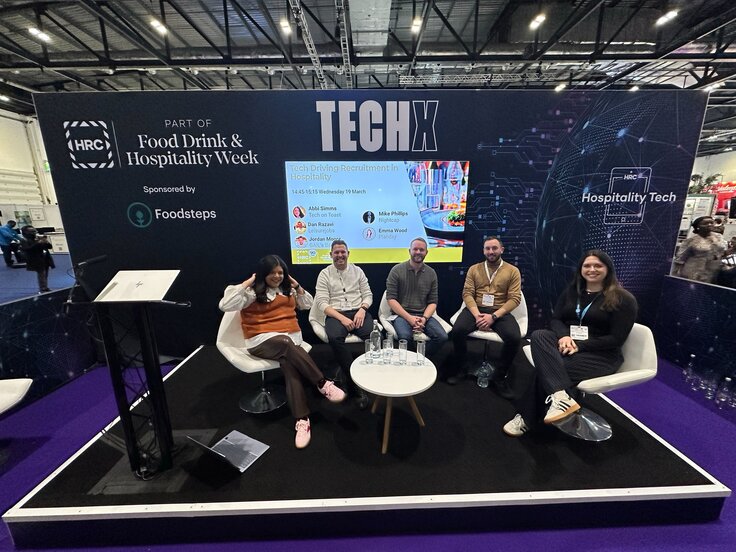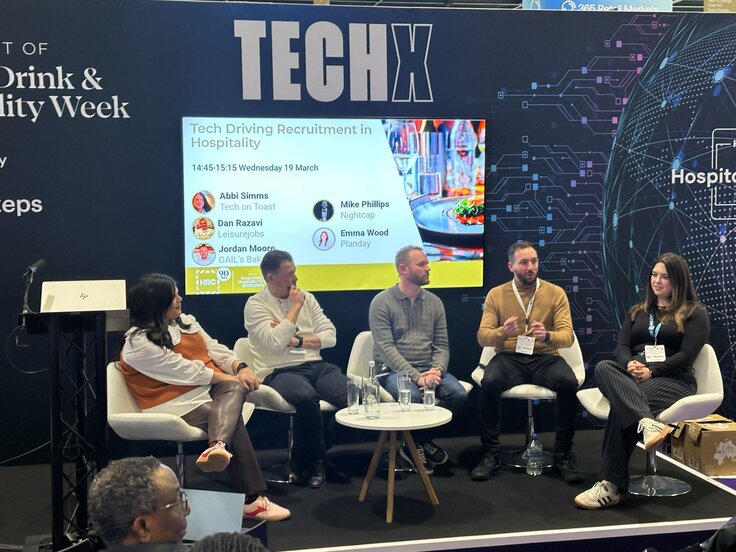
Article
3 min read
The tech driving hospitality recruitment
Alex Francis
Apr 17, 2025
What's on the menu?
Hospitality is in the grips of a recruitment crisis. It’s getting harder to find great people, and then it can be even tougher holding on to them.
It means that businesses can no longer rely on traditional hiring methods, and need to turn to new technologies to attract, engage and retain the very best people in the industry.
This was the topic of discussion at a recent panel event hosted by our friends at Tech on Toast. Made up of recruitment and HR experts from around the industry, the panel tackled the big questions facing hospitality businesses today.
Meet the panel
Our expert panel included:
- Mike Phillips – Head of Talent Attraction, Nightcap
- Dan Razavi – Director, Leisure Jobs
- Jordan Moore – Head of Talent Acquisition, Gail’s Bakery
- Emma Wood – Senior Account Executive, Planday

The candidate experience
First up on the agenda was the experience that candidates have when applying for roles. The panel discussed how things have shifted from merely filling positions to making sure there’s a cultural fit within a business, and providing an engaging candidate experience.
This can involve looking beyond the traditional CV, to things like videos, social media posts and even poetry. As Jordan Moore pointed out, no one is born with experience, so it’s important to look beyond that and see a candidate’s potential instead.
The panel stressed that candidates are also customers, and a bad hiring experience can impact a brand’s reputation in just the same way a bad customer experience can. By creating a culture where candidates and employees feel valued, brands can strengthen their long-term loyalty and ultimately hire better people.
Employee satisfaction
Everyone has elements of their job they don’t like, and in hospitality that’s often the admin side of the job. For managers and staff alike, admin can be boring and time-consuming, taking time away from interacting with customers and delivering great service.
AI can help with that. It can automate staff schedules, help with emails, and cut down paperwork, so staff can get back to doing what they do best - creating memorable guest experiences. And when job satisfaction goes up, stress goes down and staff turnover is reduced.
The rise of Applicant Tracking Systems
Some companies, like hospitality group Nightcap, have turned to Applicant Tracking Systems (ATS) to reduce bias, manage the volume of applications, and make sure that the right candidates are getting through.
But as panellist Mike Phillips, Head of Talent Attraction at Nightcap, pointed out, the software is only used for vetting and reviewing. The final decisions are still made by humans.
But the potential for these systems in the future is huge. They’ll be able to engage with candidates long-term, rather than a one-time application process, and keep communication open for potential future hires. And when it comes to the hiring process itself, they’ll be able to personalise the experience for different types of applicants, improving candidate satisfaction.

The role of AI
The panel also highlighted the role AI can play in the recruitment process, helping to reduce the admin of busy hiring managers while preserving human judgement. It can summarise CVs, highlight key achievements, and level the playing field for candidates.
But again, the panel stressed the need for balance. Automation in the hiring process only works if there’s still human interaction, and things like AI-based pre-screening can throw up misleading candidate assessments – ultimately wasting hiring managers’ time.
Holding on to your best people
Of course, recruitment is only half the battle. The panel stressed the need to focus on both the onboarding and offboarding process too, so employees have a positive experience from beginning to end.
Not only that, but keeping employees engaged in their roles is critical. Things like scheduling rotas further in advance, having clear communication with teams, and a positive workplace culture all help to keep employees happy and motivated.
It can also help avoid burnout – another big issue facing the industry. Some 69% of shift workers say they regularly feel exhausted from their work schedule, which is why we’ve created Fired up, not burnt out – a manager’s toolkit packed with advice and insights on beating burnout and building happy teams. Download your free copy today >
